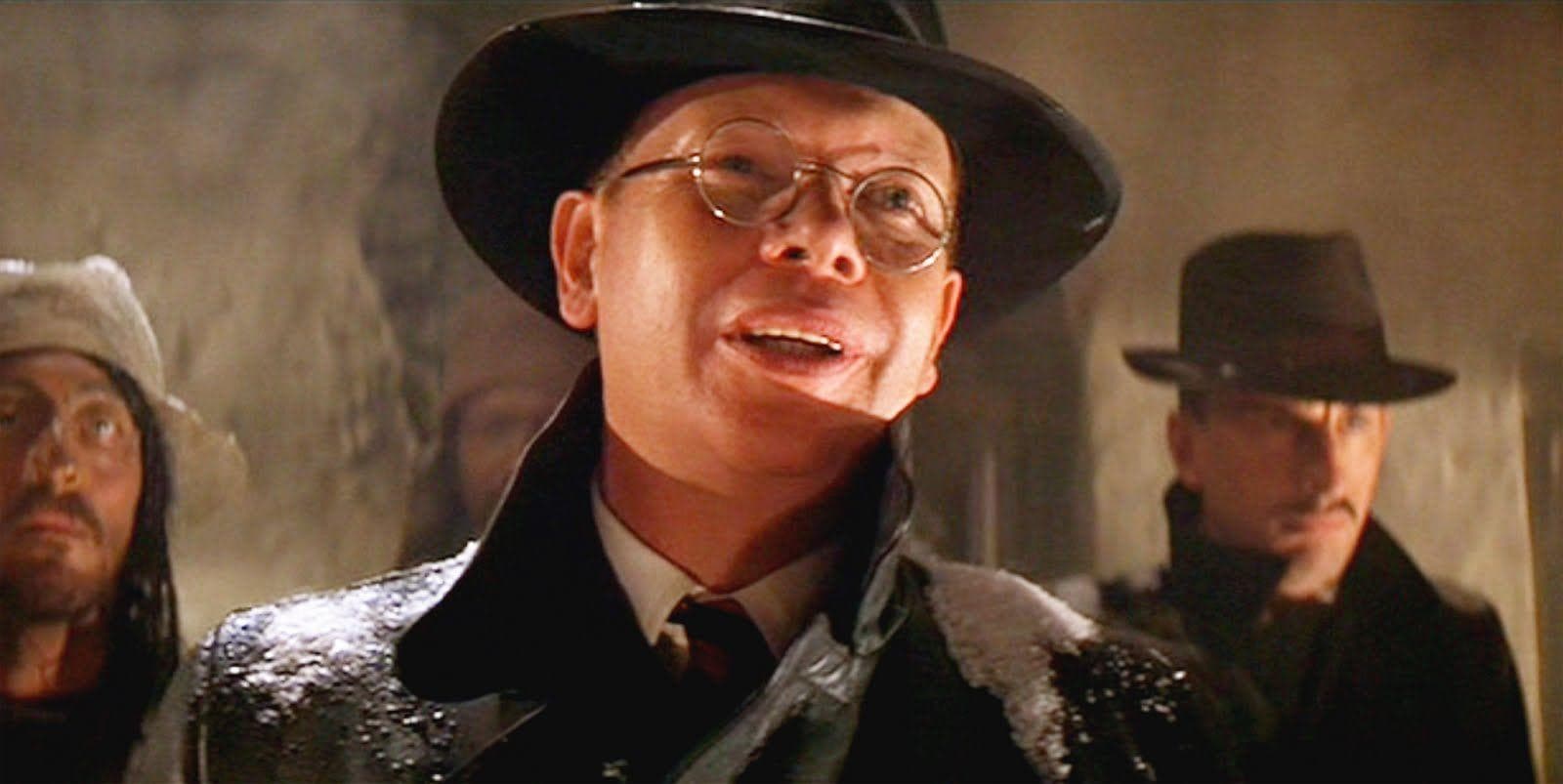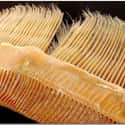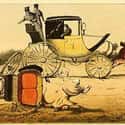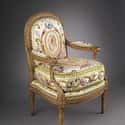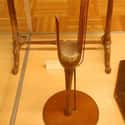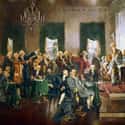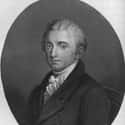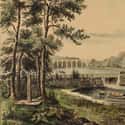-
(#1) Morris Liked Getting Busy In Public Places, Including The Louvre
Morris didn’t marry until he was 57. During his bachelor years, he had quite a few romantic escapades - one of which cost him a leg. In a different escapade in France, Morris carried on an extended affair with a married woman who lived in the Louvre.
Before it became one of the most famous art museums in the world - home to the Mona Lisa - the Louvre was a palace for the French king. And Morris’s lady friend also happened to live there. Morris recorded their love affair in his diary, using the word “celebrating” as code for sex. If his diary is any indication, apparently the two liked to take risks. One of the diary entries describes the pair having sex in the hallway with the doors open:
Go to the Louvre… we take the Chance of Interruption and celebrate in the Passage while [Mademoiselle] is at the Harpsichord in the Drawing Room. The husband is below. Visitors are hourly expected. The Doors are all open.
He didn’t record whether they were caught.
-
(#2) Morris Attempted Surgery On His Urethra With A Whalebone, And It Killed Him
Late in life, Morris experienced a blockage in his urethra that gave him trouble urinating. Today, scholars believe he may have been suffering from prostate cancer. The crafty Founding Father took a DIY approach to the problem - he attempted to treat the blockage by sticking a piece of whalebone up his urethra. In the process, he caused a great deal of damage that ultimately contributed to his death.
Days after he died, a Boston newspaper reported that Morris died from "a short but distressing illness."
-
(#3) Morris Married A Housekeeper Accused Of Adultery And Murder
For years, Morris never settled down, preferring instead to spend his time romancing married women. But he shocked the world when, at the age of 57, he married his housekeeper - and that was only the beginning.
At a Christmas party in 1809, Morris announced his marriage to Anne Gary Randolph, 22 years his junior. Anne - known as Nancy - had a reputation dating back to 1792, when she was accused of adultery and murder. Nancy, just 17 at the time, reportedly slept with her brother-in-law. The illicit union produced a baby who died shortly after birth. Nancy was tried for murder, though she insisted the baby had been stillborn. She was eventually acquitted.
On the day he married Nancy, Morris wrote in his diary, “I marry this day Anne Gary Randolph. No small surprise to my guests.”
-
(#4) Morris Lost His Leg After Sleeping With A Married Woman
Morris lost his leg at age 32 after being hit by a carriage. But what sounds like a simple accident goes much deeper. The incident happened in Philadelphia at the intersection of Logan's Alley and Dock Street, according to historian Dave Kimball. Morris, a reputed ladies' man, found himself in hot water after a furious husband learned the Founding Father was sleeping with his wife.
Morris was running from the scorned husband when a carriage ran over his leg. Unfortunately, it had to be amputated. After the accident, one of Morris's friends optimistically hoped that the new peg leg might help Morris avoid the "the pleasures and dissipations of life, into which young men are too apt to be led." In response, Morris quipped, "You argue the matter so handsomely, and point out so clearly the advantages of being without legs, that I am almost tempted to part with the other."
-
(#5) Morris Bought Marie Antoinette's Furniture And Shipped It To The Bronx
Morris acquired some very strange objects during his time as a diplomat. His tenure as the US minister to France coincided with the most tumultuous period of the French Revolution. As an eye witness to the Reign of Terror, Morris strongly opposed the Revolution, ironically siding with the monarchy. He even attempted to rescue Louis XVI and Marie Antoinette from the revolutionaries who would later execute them.
Perhaps to remember his time in France, Morris bought Antoinette's furniture. The elaborate set, which included an intricately decorated armchair, originally resided at Versailles. During the French Revolution, Morris bought the entire set and shipped it to the Bronx.
-
(#6) Morris Drove Off An Angry Mob With His Peg Leg
Having a peg leg didn't slow Morris down. In fact, his friend and fellow Founding Father John Jay told Morris that he wished his friend "had lost something else." For years, Morris kept seducing married women, even after it cost him a limb. And during his time in France, Morris used his wooden leg to chase off a mob of revolutionaries.
Morris's years in France coincided with the bloodiest period of the French Revolution. According to historian Forrest McDonald, Morris was riding in an ornate carriage with a "lady friend" when an anti-aristocratic mob descended on them. Morris pulled off his leg and shoved it out the window, shouting "Vive la Révolution." The sight distracted the revolutionaries long enough for Morris to speed off in his carriage.
-
(#7) Morris Came Up With "We The People Of The United States"
In 1787, delegates met in Philadelphia to draft a new Constitution. Morris became one of the most important members of the Constitutional Convention, giving more speeches than any other delegate - 173, to be exact. Morris promoted a strong presidency with veto power, as well as an elitist Senate. He also strongly opposed slavery.
Morris was responsible for polishing the final draft of the Constitution, and in doing so created the document's most important line. The original draft read:
We the people of the states of New-Hampshire, Massachusetts, Rhode-Island and Providence Plantations, Connecticut, New-York, New-Jersey, Pennsylvania, Delaware, Maryland, Virginia, North-Carolina, South-Carolina, and Georgia, do ordain, declare and establish the following constitution for the government of ourselves and our posterity.
Morris changed it to the much more succinct, "We the People of the United States, in Order to form a more perfect Union..."
-
(#8) Morris Hated Slavery, Unlike Many Other Founding Fathers
The Declaration of Independence famously stated, "All men are created equal." However, George Washington and Thomas Jefferson owned nearly a thousand slaves in total. In sharp contrast, Morris strongly opposed slavery. During the Constitutional Convention, Morris called slavery a "nefarious institution."
He harshly condemned the practice, saying, "Proceed southwardly, and every step you take, through the great regions of slaves, presents a desert increasing with the increasing proportion of these wretched beings."
-
(#9) Morris Created Modern Manhattan
Morris grew up in the Bronx, which was rural farmland in his day. As an adult, he played a central role in shaping the state of New York by promoting the Erie Canal. He also forever left his stamp on New York City by reforming Manhattan's city plan. In 1807, Morris was appointed to a commission charged with crafting a master plan for the growing city's layout.
In 1811, the commission produced a grid system for the city with 155 streets and 12 avenues, rejecting the circles and ovals that dominated European cities. The planners eschewed European-style plazas that created irregular building lots. Instead, Manhattan would be a city of “right-angled houses... cheap to build and... convenient to live in.” In order to create the massive change, the city had to tear down 39% of pre-grid buildings because they were in the middle of a new street.
-
(#10) Morris Grew Up In An Idyllic Estate Named After His Family
The Bronx neighborhood of Morrisania traces its history back to the 1670s, when the Morris family bought 500 acres of land along the Harlem River. When Gouverneur Morris was born on the land in 1752, by that point encompassing some 2,000 acres, it was home mainly to small farms and dairy cattle - until Morris built an enormous mansion for himself.
The Morris clan even offered the family estate to the Continental Congress as a potential site for America's new capital. Today, the neighborhood still contains St. Ann's Church, where Morris is buried.
-
(#11) It's Hard To Keep All The Morrises Straight
Gouverneur Morris wasn't the only Morris who witnessed the founding of the country. His half-brother Lewis Morris also signed the Declaration of Independence. His financier friend Robert Morris, who was not directly related to Gouverneur, also penned his name on the document.
After the war, Gouverneur and Robert collaborated to establish America's financial security. Robert Morris acted as Superintendent of Finance during the Revolutionary War, almost single-handedly keeping the war effort afloat. But Robert faced a significant downfall of his own. While Gouverneur was serving in the US Senate, Robert lost much of his money speculating on land and died in near poverty.
As for Gouverneur's unique first name, it was his mother's maiden name. And yes, it means governor. Today, BabyNamesPedia reports, "Gouverneur is not popular as a baby name for boys."
-
(#12) Morris Served In The Continental Congress As An Ally of George Washington
During the American Revolution, Morris worked for the New York revolutionary government and later served in the Continental Congress as one of its youngest members. Morris became close with George Washington, as well as many other Founding Fathers. Morris, who kept a detailed diary and recorded many details about his life in letters, served on multiple committees during the Continental Congress. And he wrote that he did the vast majority of the work on every committee on which he served.
Morris was a strong supporter of George Washington, and the two remained close for decades. Later, Morris played a central role in the Constitutional Convention. He was instrumental in shaping the Constitution that has governed America for centuries.
New Random Displays Display All By Ranking
About This Tool
Our data comes from Ranker, If you want to participate in the ranking of items displayed on this page, please click here.




